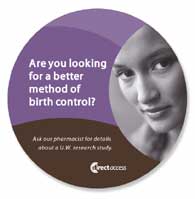 It has been my pleasure to observe and participate in the expansion of clinical services provided by pharmacists in Washington State. Our pharmacists have been recognized nationwide as critical innovators in contraceptive care – the most important of these services being pharmacist-provided emergency contraception (EC). In providing this service pharmacists have often noted how beneficial it would be if they could provide EC patients with on-going contraception before they left the pharmacy. This article is about Washington pharmacists finding a way to do just that. Once again, they are helping patients to access effective contraception in ways unheard of elsewhere in the United States. Please read this article with the understanding that you, too, may be providing this service in the near future.
It has been my pleasure to observe and participate in the expansion of clinical services provided by pharmacists in Washington State. Our pharmacists have been recognized nationwide as critical innovators in contraceptive care – the most important of these services being pharmacist-provided emergency contraception (EC). In providing this service pharmacists have often noted how beneficial it would be if they could provide EC patients with on-going contraception before they left the pharmacy. This article is about Washington pharmacists finding a way to do just that. Once again, they are helping patients to access effective contraception in ways unheard of elsewhere in the United States. Please read this article with the understanding that you, too, may be providing this service in the near future.
Don Downing, ’75
2003 Distinguished Alumnus
Pharmacists and technicians in eight Seattle-area pharmacies—four Bartell Drugs branches and four Fred Meyer stores—are collaborating in a study to provide oral contraceptives, contraceptive patches, or vaginal rings to women without the requirement of a clinic or physician visit.
The Direct Access study’s objective is to test the feasibility of pharmacists prescribing hormonal contraceptives. It is being conducted by investigators from the UW Departments of Pharmacy and Obstetrics and Gynecology, as well as from the local pharmacies. Women aged 18-45 are recruited through shelf-talkers, brochures, and posters, and in conjunction with emergency contraception consultations at the study pharmacies.
Women complete a self-screening form containing 23 questions chosen to rule out contraindications to hormonal contraceptive use, including current pregnancy. The pharmacists, working within collaborative drug therapy agreements developed with Dr. Leslie Miller of the Public Health Seattle/King County Family Planning Clinics, assist women in self-screening for appropriate hormonal contraceptive use and make the decisions about whether and what to prescribe. The initial prescription is for three cycles, after which the woman must return to the pharmacy for blood pressure and weight re-measurement. If neither is elevated beyond guidelines, the pharmacist may prescribe another ten cycles for a total of one year.
In recent years the provision of birth control has been “unbundled” from cancer screening by many family planning agencies, including Planned Parenthood, the World Health Organization, and local health departments. This has allowed non-physician prescribers to have greater flexibility in providing effective contraception in non-clinical settings. Consultation with women includes recommendations that they seek clinical care for pelvic and breast exams and Pap smears at regular periodic intervals, and STD screening as needed.
Pharmacist service fees and contraceptives are paid for by the women themselves, or by their insurance plans. Many plans will cover the products, and Uniform Medical Plan, through the assistance of Director of Pharmacy Donna Marshall, MS ’99, will cover pharmacists’ fees as well as products for their members. Discussions are in progress to sign up other health insurance carriers to participate in the project. Through collaboration with Northwest Pharmaceutical Services’ (NWPS) Joe Fazio, pharmacists are able to bill their services online to cooperating health plans.
The Direct Access Study is sponsored by the National Institute of Child Health and Human Development (NICHD) through a four-year grant for $851,604. A study Advisory Committee enjoys representation from the WA State Health Department, DSHS, Planned Parenthood of Western Washington, the American College of Obstetricians and Gynecologists, the Office of the WA Insurance Commissioner, WSMA, WSPA, WSBOP, the Northwest Women’s Law Center, PATH, two health insurers and community health centers.
Study pharmacies are pleased to accept referrals of women who are interested in the study. Additional information can be obtained from Solmaz Shotorbani, Direct Access Study Coordinator, at (206) 616-7486.
Featured on NPR and KOMO News and in the Seattle P-I